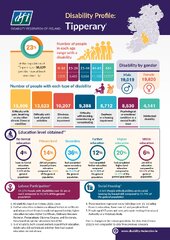Disability Profile - Tipperary
Issued on October 22 2024
Disability Profile[1]: Tipperary
23% of the population, or 38,639 people, have at least one disability
19,019 males, and 19,620 females have at least one disability
3,505 people 0-14 years old have a disability
3,403 people 15-24 years old have a disability
6,864 people 25-44 years old have a disability
11,160 people 44-65 years old have a disability
13,707 people over 65 have a disability
Type of Disability
15,806 people have difficulty with pain, breathing or any other chronic illness or condition
13,523 people have difficulty with basic physical activities
8,530 people have a psychological or emotional condition or a mental health issue
10,207 people have blindness or a vision impairment
8,712 people have Deafness or a hearing impairment
9,388 people have difficulty with learning, remembering or concentrating
4,141 people have an intellectual disability
Education Level Obtained[2][3]
4% of people with disabilities had no formal education, compared to 2.18% of the general population
14% of people with disabilities had only a primary school education, compared to 6.86% of the general population
36% of people with disabilities had only a secondary school education, compared to 31.23% of the general population
12% of people with disabilities had completed further education, compared to 12.38% of the general population
20% of people with disabilities had completed higher education, compared to 26.49% of the general population
6% of people with disabilities were still in education, compared to 10.13% of the general population
39.27% of people with disabilities over 15 are in employment[4], compared to 46.36% of the general population
14.36% of people with disabilities are in social housing[5] (by household) compared to 10.74% of the general population
Due to changes in the census questions, the data from Census 2022 is not comparable to data from previous censuses
[1] All statistics based on Census 2022, cso.ie
[2] Further education includes vocational/technical certificate and advanced certificate/completed apprenticeship, higher education includes Higher Certificate, Ordinary/Honours Bachelor, Postgraduate Diploma/Degree, and Doctorate. Data based on special tabulation from CSO.
[3] % of all adults, both ceased and not ceased their education. Adults who did not indicate whether they had ceased education are not shown.
[4] These numbers represent every individual over 15, including those in education, those over 65 and people retired.
[5] People aged 15 years and over, who were renting from a Local Authority or a Voluntary Body.

